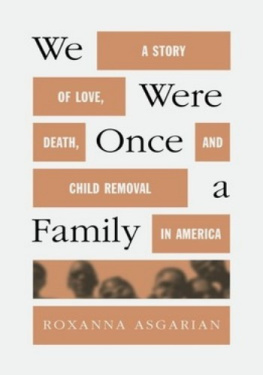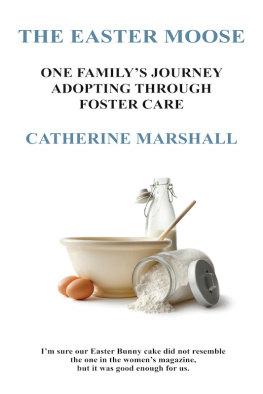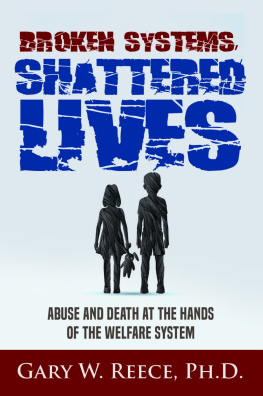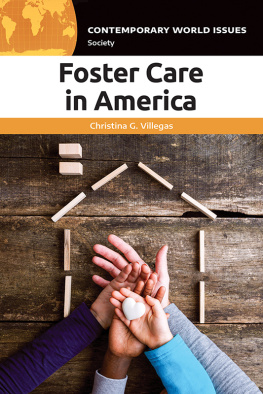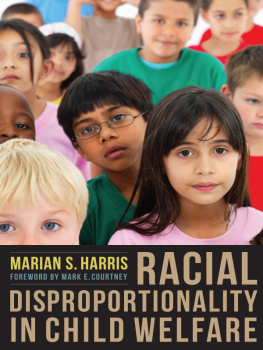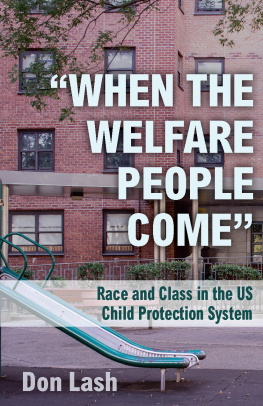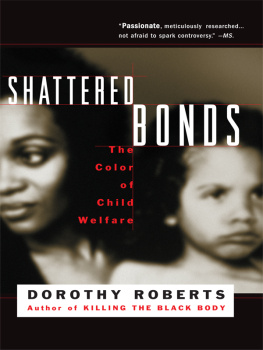The author and publisher have provided this e-book to you for your personal use only. You may not make this e-book publicly available in any way. Copyright infringement is against the law. If you believe the copy of this e-book you are reading infringes on the authors copyright, please notify the publisher at: us.macmillanusa.com/piracy.
For my son, Rocco
And in memory of Markis, Hannah, Abigail,
Devonte, Jeremiah, and Ciera
I wrote my first stories about the U.S. foster care system in 2016, while I was working at a city magazine in Houston, Texas. I began by looking deeply at the federal lawsuit against the state for its inhumane treatment of children in long-term foster care. I spent hours and days interviewing people and reading the case file of one of the plaintiffs, Trish Virgil. After being removed from her mothers care because her stepfather had physically and sexually abused her, Trish was bounced around various foster homes and institutions for years before aging out. Once she left care, she ended up right back in the same trailer with her mother and stepfather; she had nowhere else to go. Her story was harrowing, but it was far from unique. In the years since, I have spoken to dozens of young people with lived experience in foster care, and in every single case these folks endured some type of abuse after they entered care.
What we call the child welfare system is actually a large web of state, county, and city agencies that each run their own operations, with their own rules and procedures, all with the main goal of protecting children from child abuse and neglect. Because of the sometimes overlapping patchwork of agencies involved, and the fact that most child abuse and neglect cases and adoption cases from foster care are sealed, the child welfare system is a difficult one to report on.
The general understanding of the system, which is responsible for about 425,000 children around the country, is vague at best, and many people hold misconceptions about the parents and children who become entangled within it. Mainstream media outlets often report about the child welfare system only when major cases of child abuse happen; without systemic analysis, these stories can end up promoting more punitive policies aimed at families who need help. In fact, about 75 percent of child welfare cases involve not abuse but neglect, which can often be caused by or confused with poverty.
When reports emerged that two women, a married couple, had crashed their car into the ocean in late March 2018, killing themselves and their six adopted children, I was struck by all the details that were coming out. My friend Shane Dixon Kavanaugh and his team were publishing breaking news stories for The Oregonian , Portlands daily newspaper, that revealed long-term abuse by the two white adoptive mothers against their six Black children. Those stories began to paint a sinister picture of the family. When I saw that some of the children came from Harris County, Texas, where I live, I was struck by a gut feeling: I knew that there was much more to this story, and that it started earlier, way earlier, when these kids were still in their homes with their birth parents.
Two weeks after the crash, my phone rang. It was Shane, calling from his office in Portland, and I knew what he was going to say before the words came out of his mouth. Yes, I told him. I can find the kids birth parents, and I can speak with them.
As a journalist, I was most interested in looking at who has power and who does notmy aim was to write stories that hew closely to the perspective of the people without power, instead of assuming the perspective of those with it. I had done quite a few sensitive interviews by then and had been witness to many people affected by crimes, in the stage when their grief was still shock. Even so, when I first met the Davis familythe relatives of three of the children in the 2018 crashI was bowled over. This, this felt different. The familys pain ran deep. It was a pain that had existed in their lives since they first lost the children a decade before, and now it was double-edged: they were re-experiencing the trauma of the childrens removal, and they were coming to understand that the fantasies theyd told themselves about the lives the children were living were just that, fantasies. The reality was that the children had not been okay. They had not been cared for. They suffered, and then they died. They were murdered.
In the media frenzy over the Hart family tragedy, the deeper story got largely overlooked. While many of the big stories focused on Jennifer and Sarah Hart, stories about the childrenwho they were, where they came from, what happened to their birth familieswere mostly absent. Much of what was written about the kids concentrated only on their harrowing abuseeven as major questions about the child welfare systems role in the deaths went unanswered.
In the coverage of the crash, mainstream media continued in its long-standing tradition of reporting on foster care and adoption almost exclusively through the lens of adoptive parents, while largely leaving out the experiences of adoptees and birth families. We like our adoption stories to be happy endings; many people took note of the Hart case because it contradicted what they thought they knew about adoption. But since theres a scarcity of in-depth reporting about the child welfare system, people zeroed in on the womens motivations and intentions, instead of on the biased decision-making and dehumanizing practices that created the conditions that allowed the Harts abuse to flourish.
In order for the childrens stories to become the book in your hands, the birth families took a huge leap of faith, opening their homes and lives and histories to me, a stranger. I had no personal experience with the foster care system, but Id had an unstable childhood home life and could relate to some aspects of these families struggles. Above all, I was struck by the lack of dignity in the way these families were treated, as they repeatedly grieved the loss of their childrenfirst to the state, and then to their murderers.
There is a unique trust that is built between journalist and source over years of spending time and having deep conversations; its an honor for me to experience that trust. This is the hardest work I have ever done, and I have routinely confronted the fact that this reporting affected me deeply, even as I knew that the families experiencing this pain firsthand were actually living it each daypain that is hard to comprehend, that is overwhelming. As journalists, we are often taught to stay stoic, to depersonalize situations, to get out of the way of the story. This ethic has its merits, but it has costs as well.
In this book, Im not a passive observer of injustice. I note in the text places where I have influenced aspects of the story. I refer to the girlfriend and son of one Davis family memberDontayby their nicknames to be considerate of a child who is still a minor. In one case, which is also noted in the text, I have used a pseudonym for another child for the same reason. I used a pseudonym for Tammys husband, on her request. When Devonte, Jeremiah, and Ciera were adopted by the Harts, the women changed the spelling of Cieras name to Sierra. I will use the spelling of her name on her original birth certificate throughout.
This book is a culmination of five years of work. The reporting is based on extensive interviews, traveling to key locations, and studying thousands of pages of foster care case files, criminal case records, and law enforcement investigation documents. I conducted the present-day reporting in person unless otherwise noted, and I reconstructed past events by conducting in-depth interviews with multiple sources and examining primary documents related to the events. The work is also informed by my seven years of continuous reporting on the foster care system as a whole.
Next page
